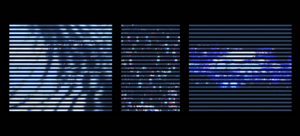
Our fascination with video in all forms his has resulted in the loss of many of the nation’s newspapers, the decline of the network documentary, the near-disappearance of the magazine of ideas, and a younger generation for whom extended time with the printed page is an ordeal.
Over sixty years ago an American philosopher described with unusual clarity the very different communication functions of visual media. Susanne Langer was interested in art and social rituals, exploring how we process pictorial information. Philosophy in a New Key (Mentor Books, 1942) still resonates as a way to understand the importance of our mid-Twentieth Century cultural turn towards images, represented primarily by television, but also all of the other digital platforms that build on the “visual interfaces” that increased the spread of digital media. Langer was writing in the 1940s and could not have anticipated how video and computer technology evolved. But her insights were taken up by the Media Ecology Movement over the years, helping to clarify a set of effects that every American needs to understand.

Here’s the key insight that has evolved from her initial work. While video and television were once celebrated as new ways to pass on information, the better assessment is that these forms actually undermine the quest for ideas. Think of ideas as the non-material but potent bases for understanding the world around us. Ideas order our thinking and give form to our values. So there is irony that the flowering of theoretical breakthroughs in psychology, sociology and other fields in the first part of the Twentieth Century the seeds of non-print media would be sown to make them seem less urgent.
Consider the growth of critical and analytical insights that came mid-century from thinkers such as Walter Lippmann (modern democracies), George Herbert Mead (the construction of the self), Kenneth Burke (how language has its way with us) and David Riesman (the nature of the American character), to name just a few. All offered works about how we consciously construct ourselves and understand the external world: elaborately laid out accounts of what Langer called “discursive understandings” which can best be understood be understood on the page.
What changed? The culture of ideas would be undermined by rapidly expanding access to the presentational form of television, which feeds the already strong human impulse to feel rather than think abstractly. In plain words, visual media tied to commercial goals are usually death to print-based explorations of ideas. In plain language, visual media tied to commercial goals are usually death to the exploration of ideas.
If this sounds like aimless armchair theorizing, it isn’t. Langer’s original insight has helped us understand that television is representational rather than conceptual. It needs to show something, and nothing is more meaningful than the human face: the primary register of emotion.
As later writers noted, we don’t watch video content for the richness of its explanatory power. In fact, a printed transcript of a supposed informational program usually looks pretty sparse in print. The quintessential moment of television is actually the close-up. Any television director learning their craft will know that the face is the informational content of television. Human features are expressive. We are hardwired to read them and absorb all the cues they give us. While a theater actor needs to project his character with his full body. A television actor knows the key to success is mostly in how he uses expressiveness centered on the eyes. In spite of what we might think, we don’t watch even a “brainy” television program like Jeopardy because “we can learn a lot.” Mostly what draws us in is the human drama of trying to find the right answer. We like to ride the roller coaster of relief or regret along with the contestant who will perform them.
So what’s the cost in living in a video-saturated world? It’s ultimately that television is generally a distraction from what we have designed a liberal education and our great academic institutions to do: to encourage exploration of ideas that illuminate the human condition. Lord knows someone like television interviewer Charlie Rose tries. So do the interviewers of book authors who regularly appear on C-SPAN. But most of us are otherwise engaged, watching sketch comedies and police procedurals featuring people in desperate straits. The gut reaction in tight close-up will always trump a “talking head.” Vital concepts like economic fairness and social justice may be important, but they have the disadvantage of no precise material form.
Ask a television director to produce a program of ideas, and they will despair. There’s only so much B-roll footage you can show to enliven a visual presentation on American criminal justice practices, the widening gap between rich and poor, or how the sale of derivatives contributed to the financial collapse in 2008. Within commercial media the preference is almost always to underwrite programs of presentational content filled with images of humans in the process of coping. These are the kinds of “expressive moments” a CBS News executive once noted should be the bases of most of his network’s stories.
Because longer discussions of policy and ideas can’t compete, our fascination with video in all forms his contributed to the loss of many of the nation’s newspapers, the decline of the network documentary, the near-disappearance of magazines of ideas, and a younger generation for whom extended time with the printed page is an ordeal.
In American culture there is an entire turn away from accepting and exploring challenging issues of human and social complexity. Not only are presidential campaigns beginning to resemble reality shows, with their heightened moments of rage and put-downs, but we now expect that any expert called upon to comment on a breaking story should be able to explain themselves in seconds rather than minutes.
We are indeed paying a high price in our wholesale flight from the realm of discursive media. If conceptual thinking is an ability that makes us smarter, we have reasons to be concerned that our fascination with screens is doing the reverse.
Comments: woodward@tcnj.edu
